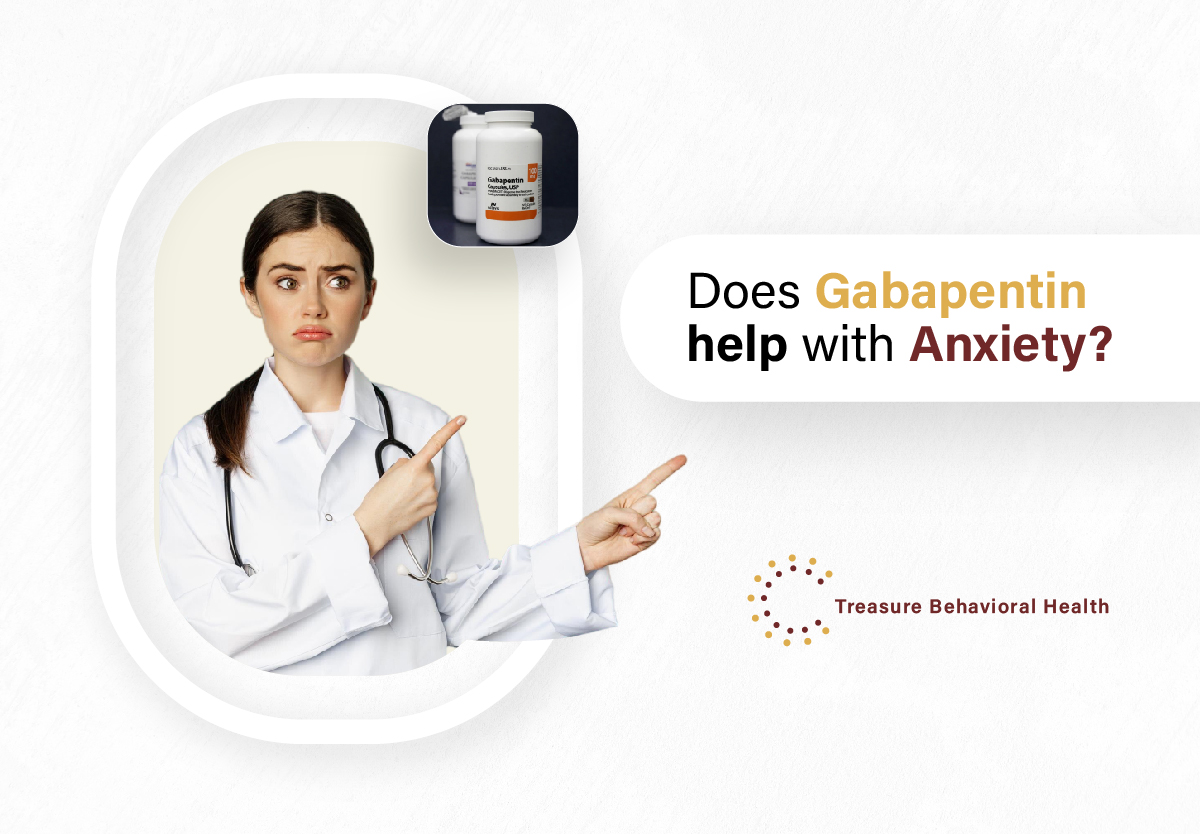Worldwide, anxiety disorders rank high as widespread mental health issues. Several treatments exist, yet the quest for more effective ones continues.
A promising solution is Gabapentin. Initially created for epilepsy and neuropathic pain, it’s now being spotted as a potential bonus treatment for anxiety.
But does gabapentin help with anxiety? This blog post looks into how gabapentin helps with anxiety. It includes scientific facts, expert views, and thoughts on safety.
What is Gabapentin?
Let’s talk about Gabapentin you might also know it as Neurontin or Gralise. It’s a type of medicine used to control seizures and manage pain, the FDA initially approved it for those purposes.
This med tackles the job by changing how your nerves send messages to your brain which can modify pain perception and seizure activity.
Now, let’s dive into how Gabapentin works.
How Gabapentin Works:
- Mechanism of Action:Gabapentin acts like the brain’s own chemical messenger, GABA (gamma-Aminobutyric acid). But it doesn’t latch onto the same spots as GABA. Instead, it binds onto what’s called voltage-gated calcium channels, which are found in our brain and spinal cord. This action helps turn down the volume on certain excitatory neurotransmitters.
- Impact on Anxiety: By modulating neurotransmitter activity, gabapentin can stabilize neural pathways that are hyperactive in anxiety disorders.
Safety Concerns and Common Side Effects:
- Common Side Effects: Drowsiness, dizziness, and fatigue.
- Serious Side Effects: Possible increased risk of suicidal thoughts, mood changes, and respiratory depression when combined with other CNS depressants.
- Safety Profile: Mostly safe when used right, but you must talk to a doctor to get advice that fits your needs.
Does Gabapentin Help with Anxiety?
Indeed, Gabapentin might aid with anxiety, though it works differently for everyone. Studies on its usefulness for anxiety are ongoing, with a mix of hopeful outcomes.
Some research suggests Gabapentin can lower anxiety symptoms markedly.
But, it’s crucial to recall that Gabapentin, despite showing promise, doesn’t work for every anxiety disorder. Reactions differ from person to person, and thorough medical research is needed to entirely grasp its pros and cons.
Comparing Gabapentin with Other Anxiety Medications and Therapies
Let’s look at gabapentin for anxiety and see how it stacks up against common treatments.
Traditional Anxiety Medications
- Selective Serotonin Reuptake Inhibitors (SSRIs): SSRIs, often used for anxiety, work by boosting serotonin brain levels. This can brighten mood and ease anxiety.
- Benzodiazepines: Then there’s benzodiazepines. Drugs like lorazepam and diazepam provide quick relief from anxiety. The downside? They can be addictive and are usually only used short-term.
- Buspirone: This is an anti-anxiety drug that doesn’t hold the same dependence risk as benzodiazepines.
Alternative Therapies
- Cognitive Behavioral Therapy (CBT): Cognitive Behavioral Therapy (CBT) is a strong, drug-free method. It guides people to spot and alternate negative thought cycles and actions.
- Mindfulness and Meditation: Techniques that promote relaxation and can reduce anxiety symptoms.
Gabapentin may offer some advantages over these treatments like fewer sexual side effects compared to SSRIs and a lower risk of dependence compared to benzodiazepines. Yet, it might not offer quick help like benzodiazepines, or the lasting effects of CBT.
Practical Advice for Considering Gabapentin for Anxiety
If you or a loved one is considering gabapentin for managing anxiety, here are some practical steps to take:
- Consult with a Healthcare Provider: Share your symptoms, past medical issues, any medicines you’re taking right now. Your healthcare pro can figure out gabapentin’s right for you or not.
- Understand the Off-Label Use: Since gabapentin didn’t get official approval for anxiety, make sure you totally get what off-label use means.
- Monitor Your Symptoms: Jot down any side effects you get. Regular check-ins with your healthcare pro are super important.
- Explore Comprehensive Treatment Options: Think about merging gabapentin with treatments like CBT. This could create a complete plan for managing anxiety.
Conclusion
Gabapentin can be a helpful anxiety treatment, based on early studies and some patient results. But, it can also present risks. It’s important we use it wisely and with a doctor’s guidance.
Feel free to share your viewpoints or personal stories about gabapentin and dealing with anxiety in the comments area below. Your thoughts might assist others in their path to improved mental well-being.
For more information on anxiety treatment, contact us directly at Treasure Behavioral Health today.
FAQs
Can you take gabapentin and lorazepam together?
Adding these two can heighten sleepiness and slow breathing. Talk to your doctor first.
Does gabapentin help with anxiety?
Some find relief with gabapentin, but it’s not approved by the FDA for this. Ask your doctor for advice.
Gabapentin hot flashes dose?
The starting dose is 300 mg/day for hot flashes, and it can be increased to up to 900-2400 mg/day if needed. Check the right dosage with your doctor.
Gabapentin and trazodone for anxiety?
Both can be used for anxiety but ask a doctor for the right dose.
How long does gabapentin stay in your system?
Its half-life is 5-7 hours, but it can linger in your body 1-2 days after the last dose.
Can you take gabapentin with a sleeping pill?
Mixing them increases sleepiness and drowsiness. Your doctor should advise.
Gabapentin vs xanax?
Both manage anxiety but in different ways. Gabapentin isn’t controlled like Xanax and might have less risk of addiction.
Does gabapentin feel like Xanax?
Gabapentin doesn’t give the instant relief that Xanax does, it takes more time to work.


No comment